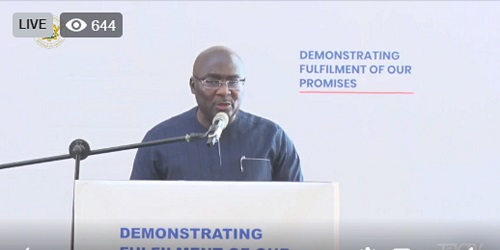Vice President Dr Bawumia has maintained that the NPP government has arrested the rapid depreciation of the cedi.
According to him, the depreciation figures clearly show that they have done a good job in reducing the rate of the cedi depreciating against other trading currencies especially the dollar.
Addressing a town hall meeting in Kumasi to outline the successes chalked by the NPP government based on the promises made during the 2016 general elections, Dr Bawumia said the floating exchange regime used by the country will never allow a fixed exchange rate.
Explaining the factors that influence the exchange rate, Dr Bawumia said "at basic level, it's influenced by factors such as relative demand and supply for foreign currencies, .... generally it reflects the purchasing power of one currency to another, countries have a choice to two types of exchange rate regimes, you can have a fixed exchange regime or the floating exchange regime where the exchange rate is determined by forces of demand and supply. Ghana operates a floating or managed a floating regime and for that reason in Ghana, we should never expect that the exchange rate will be fixed. It will fluctuate depending on demand and supply, what policymakers can do it to control the rate of depreciation or appreciation of the currency through sound policy."
READ ALSO : FX Development committee to probe cedi depreciation violates BoG regulations - Prof. Gatsi
He noted that "In the context of this, a floating regime arresting the depreciation of a currency can only mean slowing down the rate of depreciation and stopping the rapid and volatile depreciation of the currency, generally, there is a direct relationship between higher inflation and the exchange rate appreciation or depreciation and if you look at the table it tells you that fundamentally what determines an exchange rate of an economy is largely driven by inflation differentials other factors can happen in the short period to affect the currency but whenever you have higher inflation relative to the currency you dealing with you will have higher depreciation if your inflation lowers you will have lower depreciation.."
Responding to critics that he has failed in managing the cedi as he promised, the Vice President maintained that they have arrested the cedi based on the facts he has presented.
"Between 2013 and 2016 is depreciated 18% and under Akufo-Addo for the first three years it depreciated by 8.73%, so you see from this table that the cedi exchange rate under the NPP government of 2017 and 2019 is twice as stable as it was under the NDC administration, it has depreciated by 50% less. Under the NPP we have arrested the rapid depreciation of the cedi.."Â
The cedi is currently trading at 5.41905 cedis to a dollar.Â





